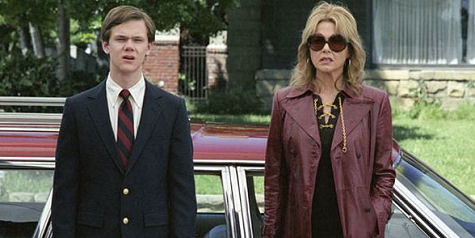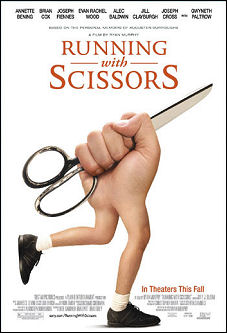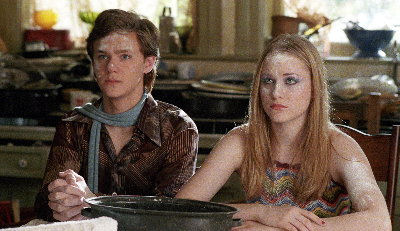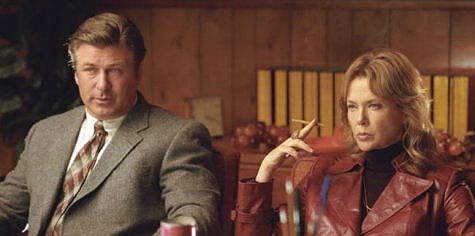Hell House
Anyone who tells you Ryan Murphy‘s Running with Scissors is funny — as in a film that makes you laugh, which is an activity regarded in most cultures as something positive and good for the soul — has a very, very twisted idea of what “funny” is. On the other hand, certain aspects of blue-state culture are turning more and more perverse as things move along and — who knows? — maybe the people who will laugh at or with this film will outnumber people like myself.

But I respect Running With Scissors, which is based on Augusten Burroughs‘ popular 2002 autobiography, for its unmitigated, unapologetic torture-chamber vibe. A film as difficult to sit through as this one is nothing if not bold. And there are some — New York Observer critic Andrew Sarris and Village Voice critic Rob Nelson — who think it’s quite funny so there’s no accounting for anything or anyone.
Urban culture has afforded a certain designation of respect for films like this. Scissors is basically an extreme permutation of grand guignol gay camp, and as such belongs in a tradition of archly mannered, darkly funny shockers like Whatever Happened to Baby Jane? and Mommie Dearest and that line of country. Diseased behavior, ultra-corroded personalities, hair-pulling, etc.
< ?php include ('/home/hollyw9/public_html/wired'); ?>
Other reviewers have mentioned the drawings of Edward Gorey and Charles Adams as stylistic influences. I think Scissors is actually more of a cross between early John Waters and The Hills Have Eyes, only with an effete surburban milieu and self-destructive nutso behavior substituting for a trailer-trash backdrop and killings and mutilations.
You have to at least give Murphy some kind of cojones award for adapting a book as gnarly as Burroughs’ and being relatively forthright in translating it. Burroughs’ writing style is clean and well-ordered, but his life story is all about suffocation, madness, imprisonment, torture, abuse…c’mon.

And so viewers are put on a ride with young Augusten (Joseph Cross) suffering under an obsessively egoistic mom (Annette Bening) and alcoholic dad (Alec Baldwin) and then getting through their divorce, and eventually being sent to live with her oddball therapist, Dr. Finch (Brian Cox) and his emotionally curdled family — wife Agnes (Jill Clayburgh), daughters Natalie (Evan Rachel Wood) and Hope (Gwynneth Paltrow) — and an unshaven 30ish wackjob (Joseph Fiennes) with whom he has his first same-sex affair.
Murphy doesn’t shrink from the psychological boils and emotional leprosy that seep out of every character, every page. (I’ve read portions of the book since seeing the film.) He lets you have it with both barrels. And I respect the ballsiness of doing that and then turning around and saying, “Okay, now pay ten bucks to see this.” He walks the walk and does the thing. And if I were a fan of this kind of dark and diseased film, I could imagine being satisfied with it.
The only time I looked at the ceiling and counted to ten was during a toilet-bowl contemplation scene. Dr. Finch is convinced that the shape and/or flotation qual- ities of…I’m not going to describe this any further. Go to the movie and absorb it directly. I won’t be a go-between.
Will Bening be Oscar nominated for Best Actress? She certainly gives the part (and the audience) hell. Like Murphy, she doesn’t shrink from the material. But to what end? Oscar-nominated perfs tend to give pleasure on some level — recog- nizing some aspect of a friend or a parent or a mate in a performance, deriving some insight into why people act they way they do…something. Bening’s performance is totally blazing and balls-out, but it’s not the sort of thing that usually inspires affection or allegiance.

The actors are all pretty vivid and, in a sense, uniform. Clayburgh is just as memorable as Bening, but my God, the poor woman. I liked Cross the most because he’s the only sane and half-reasonable one. Oh, and I liked Baldwin’s character after he gets sober. Does this constitute a spoiler?
You could call Scissors a cautionary tale of sorts. You could say Murphy and Burroughs are saying if any aspects of our own lives resemble the madhouse depictions in the film, then we might want to take stock and make some changes, etc. But you could say that about The Sorrow and the Pity…about anything.
Running with Scissors is not funny, not entertaining, not touching…but I can honestly call it staggering. And never boring.
If you’re twisted enough, you might have a ball with it…great. But if you are a relatively healthy, untwisted sort, watching this movie is an exercise in claus- trophobic agony. But in a ballsy, non-trashy way. It’s like someone coming along and stabbing you in one of your nostrils with an electric toothbrush and then hitting the “on” button. Remember rolfing? Therapists sticking their fingers up their patients’ nose and patients feeling better for it? That’s kind of the idea here.

